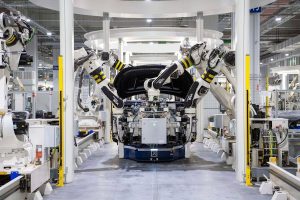All You Need to Know About Solar Inverters

Solar inverters, also known as PV inverters, are one of the most essential components of a solar energy system. A solar inverter converts the direct current (DC), produced by solar panels, into alternating current (AC) for home and commercial use.
Without solar inverters, you practically cannot use the energy generated by a solar system.
What is a Solar Inverter?
A solar inverter forms a crucial part of a solar energy system. Its main role is to convert the direct current from the solar panels into alternating current that can be used to run electrical appliances and machines at home as well as commercial establishments.
Most appliances used at homes run on alternating 120V/240V. Consequently, the variable DC output from the solar panels needs to be transformed into AC output by the solar inverter.
What are the Applications of a Solar Inverter?
Solar inverters are essentially the brain of the solar energy system installed at residences and workspaces. Here are the reasons why a solar system cannot function without a solar inverter:
- Solar inverters convert DC to AC—needed to run common electrical appliances and machines at homes and commercial establishments.
- They maximize the power output by keeping track of the voltage of the solar array to figure out the maximum power at which the modules can run. The inverters can quickly identify when the modules are degraded or there is shading from the environment.
- Nowadays, there are smart inverters that can facilitate two-way communication with the grid. As a result of the inverter’s grid supporting function, they can help your solar system ride through voltage changes with minimal disturbance. Notably, there are smart inverters that can assess how long the disturbance will last and turn it off if it persists.
- With advanced software, the inverters can also perform supportive roles in dealing with communication with the grid, regulating frequency, voltage, and other controls.
- Inverters can further come in handy to keep track of your solar system’s power output. You can even get reports on power production with specifics on error codes, power reduction data, and diagnostics from inverters etc. It is worth mentioning that you can do this from your smartphone apps or computers, given that the inverters of today can connect through Wi-Fi, Bluetooth, or hardware Ethernet.
- With its ability to ensure safe system operation, a solar inverter can also save you tons of money. When there is an electric arc due to degradation or system ageing, the inverters completely switch off, preventing great harm.
Factors to Consider When Choosing a Solar Inverter
Sure, here are some factors to consider when choosing a solar inverter:
Size and Capacity:
Size and capacity are essential factors to consider when choosing a solar inverter. The size of the solar inverter should match the size of the solar panel array to ensure efficient energy production. The capacity of the inverter should also be able to handle the maximum output of the solar panels.
The size of the solar inverter is typically measured in kilowatts (kW) and should be chosen based on the maximum output of the solar panel array. A general rule of thumb is to choose an inverter with a capacity of 80% to 125% of the maximum DC power output of the solar panels. Choosing an inverter with too low capacity can lead to underutilization of the solar panels, while choosing an inverter with too high capacity can lead to inefficiency and increased costs.
Efficiency and Performance:
fficiency and performance are important factors to consider when choosing a solar inverter. The efficiency of a solar inverter refers to the percentage of DC electricity produced by the solar panels that is converted into usable AC electricity. Higher efficiency means more energy is converted, resulting in greater energy output and lower energy costs.
Maximum power point tracking (MPPT) technology is also an important aspect of a solar inverter’s performance. MPPT technology enables the inverter to track the optimal voltage and current levels of the solar panels to maximize their power output. This technology ensures that the solar panels are operating at their highest efficiency level, which results in increased energy production and greater cost savings.
Solar Inverter Types
A solar inverter’s price is based on its type. There are three types of solar inverters—string inverters, microinverters, and power optimizers.
Of the three, string inverters are the most commonly used across the world. Let us look at each type in detail:
- String Inverters
String inverters are the most cost-effective model and their usage is limited to places with less shading; where you get enough sunlight almost throughout the year. These inverters are connected to a solar array in series formation. The performance of the string inverter is equal to that of the weakest performing panel.
- Microinverters
They are mounted on the back of each solar panel and consequently, they allow you to monitor each panel’s performance in converting DC to AC. A key advantage of opting for microinverters is that it eliminates the need for a central inverter as all the inverters are installed on the roof itself.
- Power Optimizer
Located on each solar panel, power optimizers do not convert DC to AC on the panel site. Instead, the optimizers on the inverter condition the DC and pass it on to a string inverter. The power optimizer is preferred in areas with shading.
Recommended Reading:
- A Homeowner’s Guide to the Solar Tax Credit
- Know How to Install a Solar Inverter Battery
- Reasons You Need Professional for Rooftop Solar Power Installation
- Maintenance Tips for Lead-Acid Solar Battery
- Solar Battery Price
Conclusion
Every home and office has different solar needs, but ultimately, they all require a highly efficient and reliable solar inverter. Whether you are implementing off-grid or on-grid or even a high-powered 300 Watt Solar Panel system, your priority should be to pick the right inverter.
In case you are unsure about choosing the right solar inverter that best suits your needs, you can seek the assistance of solar industry experts at Genus. We, at Genus, will be more than happy to help you install and reap the benefits of solar energy while staying cost-effective.






